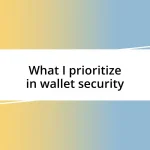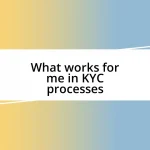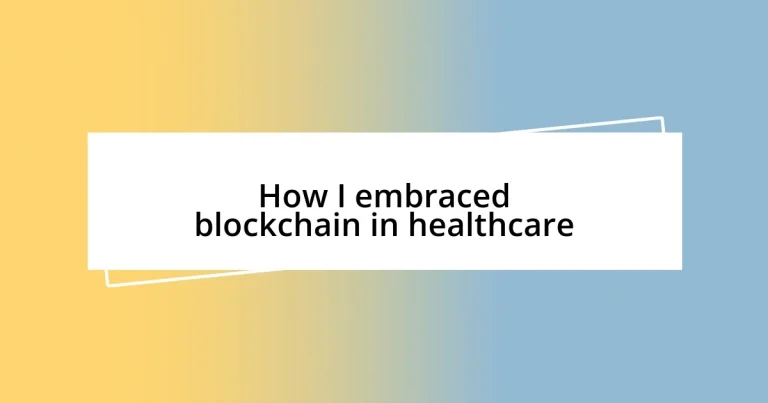Key takeaways:
- Blockchain enhances data security, interoperability, and patient control in healthcare, addressing critical challenges like data breaches and fragmented systems.
- Successful case studies illustrate blockchain’s potential to reduce operational costs and improve patient satisfaction, notably in administrative processes and clinical trials.
- Future trends include decentralized health networks, smart contracts for streamlined transactions, and improved drug traceability to combat counterfeit medications.
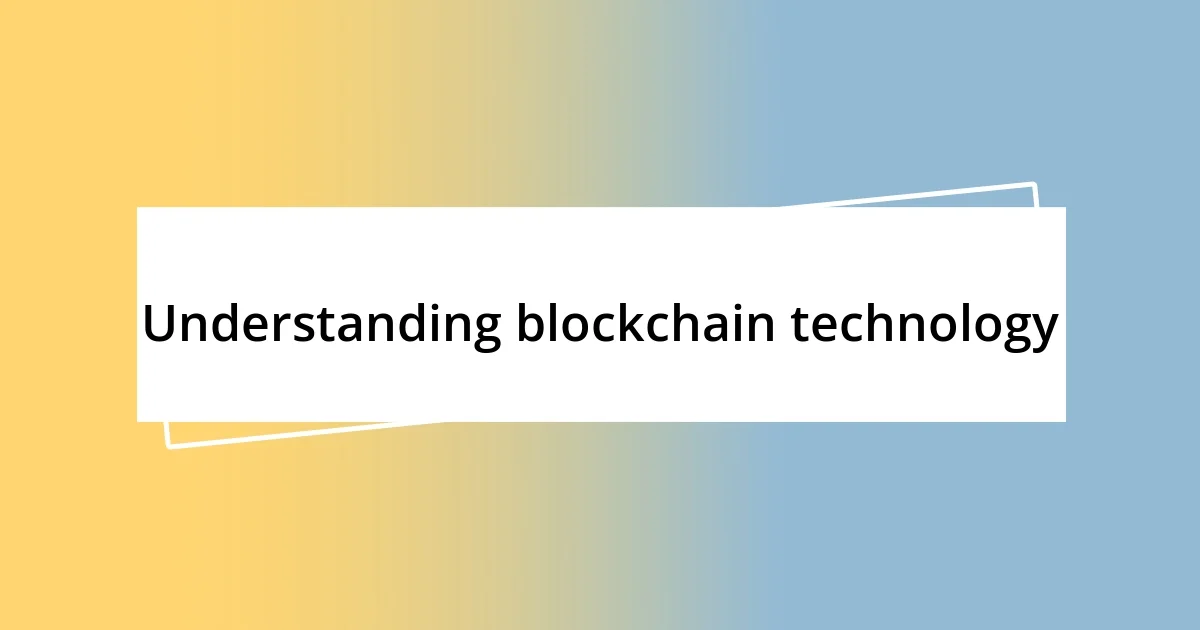
Understanding blockchain technology
When I first encountered blockchain technology, I was both intrigued and overwhelmed. The concept of a decentralized ledger, where transactions are recorded across multiple computers, felt revolutionary. It made me wonder—what if we could ensure data integrity in ways we had never thought possible before?
As I delved deeper, I discovered that blockchain operates through a system of cryptographic hashes and consensus mechanisms. This means every change made to a record is not only verified but also permanently etched onto the chain—like a diary entry that can never be erased or altered. I found this particularly fascinating; it’s like having a reliable friend who can confirm every detail of your story without fail.
Realizing the potential of blockchain sparked a sense of excitement in me. I began to picture its impact on healthcare—how it could facilitate secure patient data sharing and enhance trust among stakeholders. It made me reflect: what if patients truly owned their data, rather than feeling like passive recipients of care? This shift could transform the doctor-patient relationship, and that possibility has stuck with me ever since.
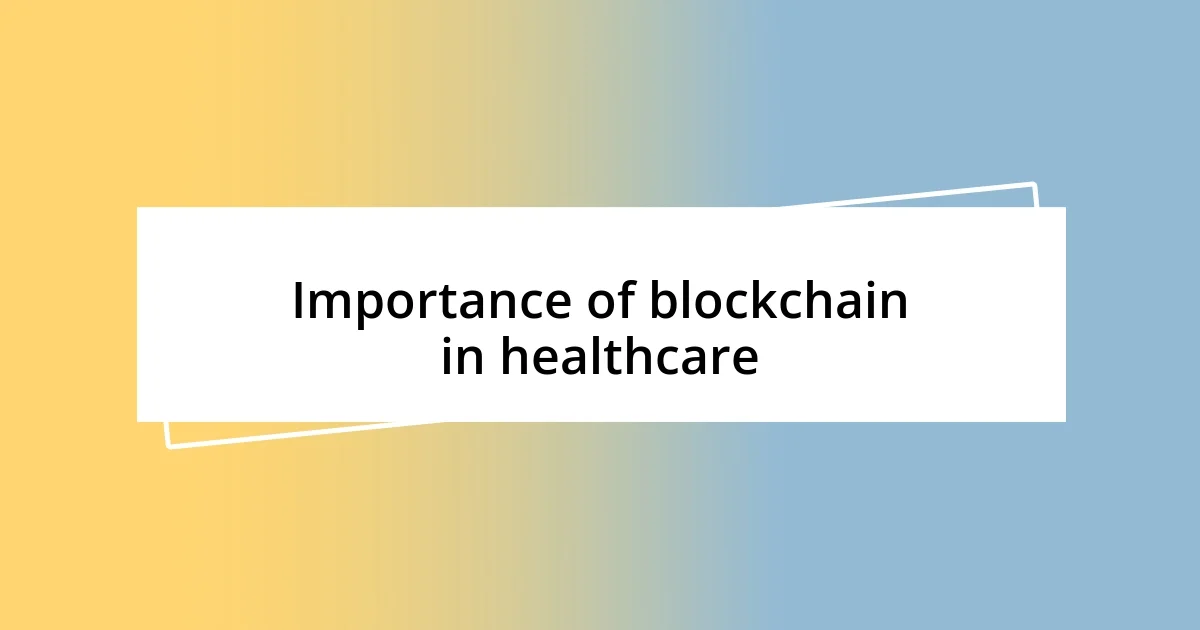
Importance of blockchain in healthcare
When considering the importance of blockchain in healthcare, I can’t help but think about the security it offers. Imagine a world where patient records are invulnerable to tampering or breaches. I once read about a case where a major hospital faced a cyberattack, compromising thousands of patient records. That incident highlighted how vital it is to protect sensitive information—and blockchain’s decentralized nature could have been a game-changer in preventing such breaches.
The potential for improved interoperability among healthcare providers is another aspect I find compelling. With blockchain, different systems could communicate seamlessly, enabling healthcare professionals to access a patient’s complete medical history in real time. During my volunteer work, I witnessed how patients often had to repeat their medical narratives to different specialists. It’s not just frustrating; it wastes time and can result in poor care decisions. Blockchain can eliminate these hurdles by creating universally accessible, secure patient data.
Lastly, I believe the transparency provided by blockchain could foster trust between patients and healthcare providers. Trust is fundamental in healthcare; if patients feel confident that their data is secure and their decisions are informed, it enhances the entire experience. I recall a moment when a patient shared their concerns about data privacy with me. I assured them that blockchain could be a solution, protecting their information while empowering them to take control of their own health records.
| Feature | Traditional Systems |
|---|---|
| Data Security | Vulnerable to breaches |
| Interoperability | Often disconnected |
| Transparency | Limited access to info |
| Patient Control | Low ownership |
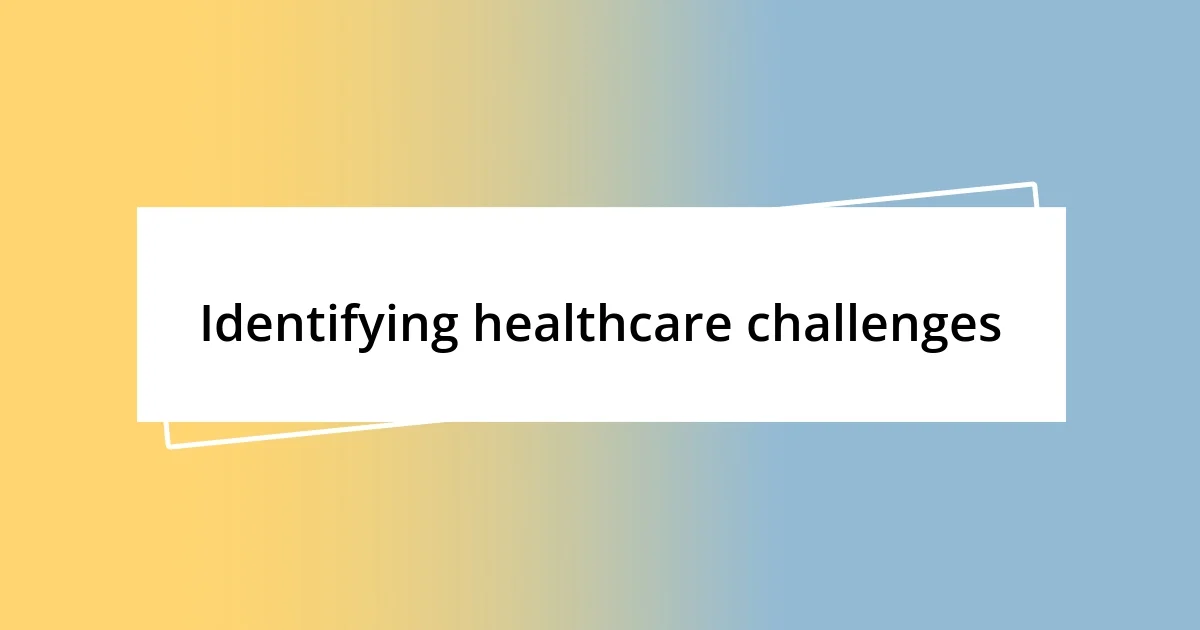
Identifying healthcare challenges
Identifying healthcare challenges is crucial for understanding where innovation can make a meaningful impact. From my experience, several persistent issues plague the healthcare system, causing inefficiencies and dissatisfaction. These challenges often stem from outdated technology, mistrust, and fragmented processes, leading to poor patient outcomes.
- Data Breaches: Sensitive patient information is frequently compromised.
- Interoperability Issues: Medical systems often struggle to communicate seamlessly, causing delays in care.
- Data Ownership: Patients largely lack control over their own health records.
- Duplicated Testing: Due to a lack of shared information, patients sometimes undergo unnecessary tests, contributing to higher healthcare costs.
Reflecting on a moment when a family member struggled to track their medical history illustrates the consequences of these challenges. They felt lost navigating various providers, often repeating their health story without access to a comprehensive record. It was frustrating for all of us, emphasizing just how critical it is to address these hurdles in healthcare.
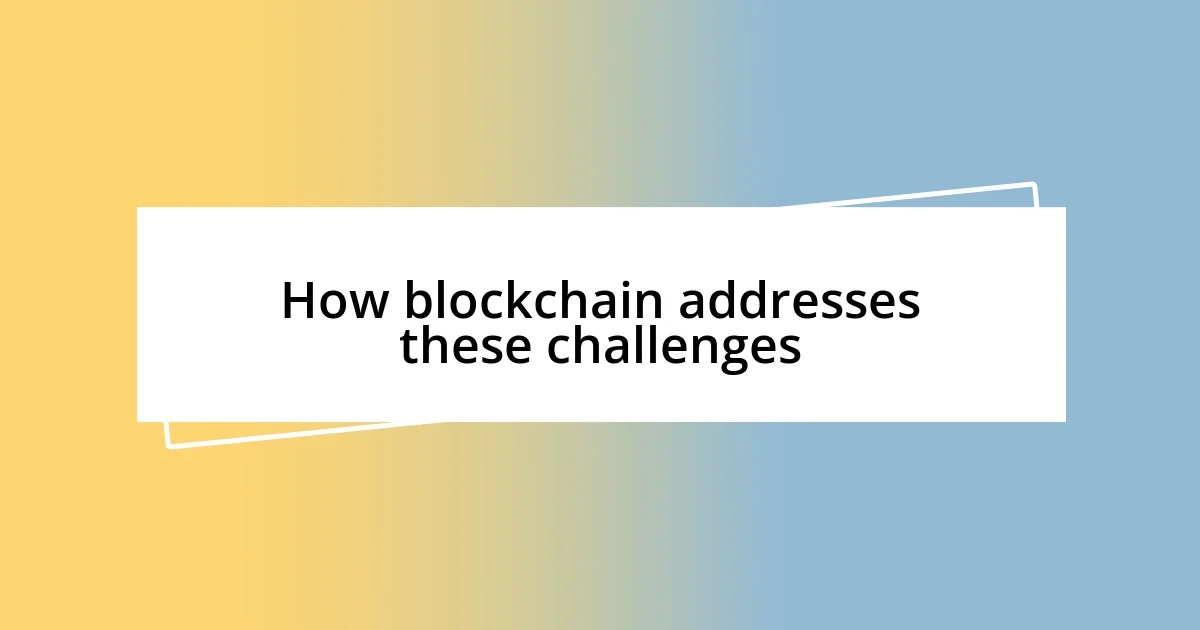
How blockchain addresses these challenges
Blockchain effectively addresses the critical challenge of data security in healthcare. I remember a conversation I had with a healthcare professional who shared concerns about the rising number of data breaches. Just think about it: with traditional systems storing vast amounts of sensitive information in central databases, they become prime targets for hackers. Blockchain changes the game by utilizing a decentralized approach, making it exponentially harder for data to be compromised. This not only fortifies security but also instills a sense of confidence among patients, knowing their information is better protected.
On the interoperability front, I often reflect on the frustration experienced during my own medical appointments, where I encountered systems that just didn’t communicate. Imagine walking into a doctor’s office and having to redo tests simply because the new provider couldn’t access your previous medical records. With blockchain, the potential for seamless data sharing becomes a reality. It can create a single source of truth that eliminates delays and redundancy, saving both time and costs associated with unnecessary tests. I see this transformation as not just a technological upgrade, but a tangible improvement in patient care and satisfaction.
The issue of data ownership resonates deeply with me, especially as I’ve seen firsthand how much confusion arises when patients don’t feel in control of their health information. Do you remember the last time you needed your medical history but had no easy way to access it? Blockchain offers a solution by putting patients back in the driver’s seat, allowing them to manage their own records securely. This empowerment can shift the dynamic between patients and providers, fostering a collaborative relationship that leads to better healthcare outcomes. By giving patients ownership, we can transform how healthcare is experienced—making it more personalized and trust-based.
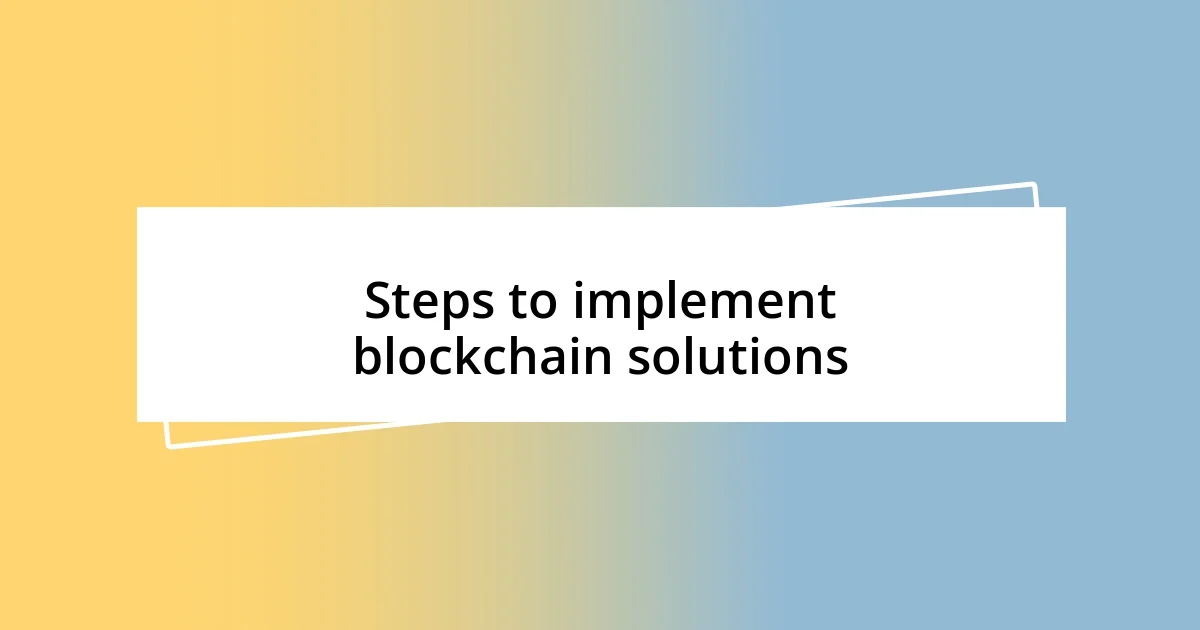
Steps to implement blockchain solutions
When it comes to implementing blockchain solutions in healthcare, the first step is to conduct a thorough needs assessment. I recall when I worked on a project aimed at improving patient data management; we gathered insights from both healthcare providers and patients to identify specific pain points. This process was eye-opening for me, as it became clear that each stakeholder had different needs and expectations, which is crucial to address even before considering the technology itself.
Next, I found that forming a multidisciplinary team is essential for success. Bringing together experts from IT, healthcare, and regulatory backgrounds facilitates a comprehensive understanding of requirements and challenges. One project I participated in had a health informatics specialist, software developers, and legal advisors working side by side. It was fascinating to see how much richer our solutions became; each perspective added layers of depth that I hadn’t considered—proving that collaboration is truly at the heart of innovation.
Once the groundwork is laid, piloting the blockchain solution on a small scale is vital. I remember my excitement during a trial run of a blockchain-based patient data-sharing platform; the results amazed me. We could track patient information in real time, and staff reported fewer delays and errors in patient care. It was a reminder of how important it is to address initial implementation hurdles before scaling up. After all, wouldn’t you agree that small victories pave the way for larger achievements?
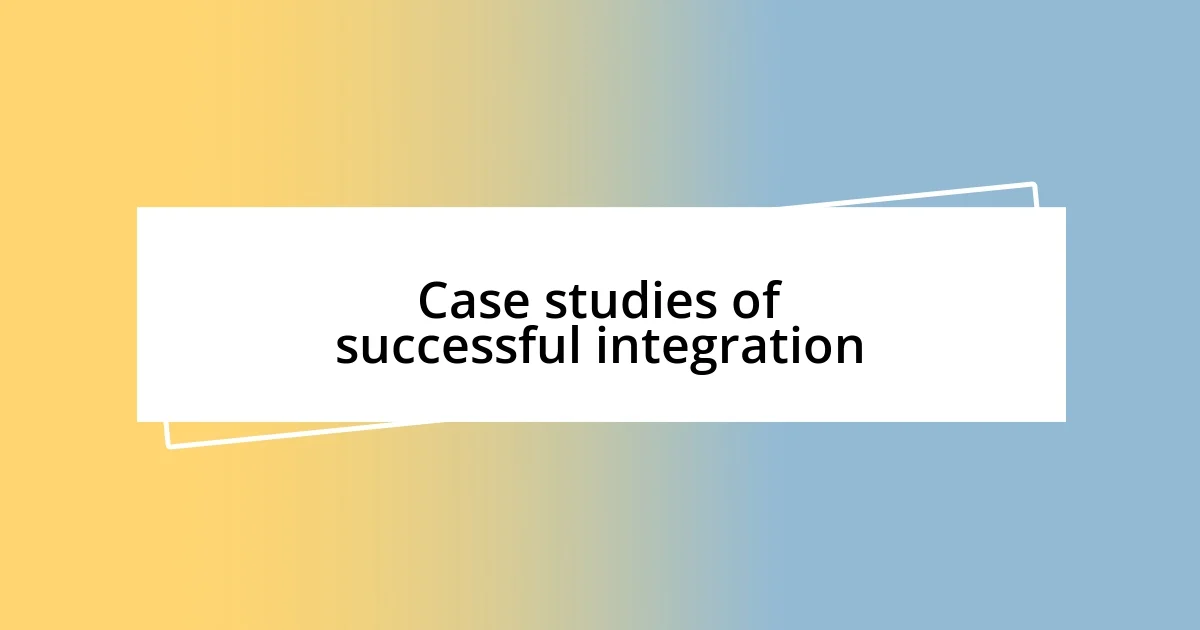
Case studies of successful integration
One notable case study that stands out to me is the collaboration between the healthcare provider Shift Health and a blockchain startup called Solve.Care. I remember hearing about how they implemented a solution to streamline administrative processes around care coordination. The results were striking: they reported a 20% reduction in operational costs and significantly improved patient satisfaction scores. This just goes to show how blockchain not only enhances efficiency but can genuinely transform the patient experience.
Another example that left a lasting impression on me was a pilot project at the University of California, San Diego, which utilized blockchain for secure medical records sharing during clinical trials. I could feel the excitement in the air as researchers discussed how real-time access to information improved their ability to track participant outcomes. The integration represented a major leap forward, illustrating how immediate access to accurate data could lead to more informed decisions and ultimately better patient outcomes. It made me wonder: if this can be done on a trial basis, what could be achieved if widespread adoption occurred?
In a more personal anecdote, I recently came across a healthcare blockchain initiative focused on pharmaceutical supply chains. It struck me how this technology helps prevent counterfeit medications—a topic I’ve always been passionate about. Hearing stories of patients receiving genuine medications, when they’d previously encountered fakes, deeply resonated with me. It made me think about how critical it is for our health systems to ensure the integrity of what we consume, highlighting blockchain’s potential to change lives in very real, tangible ways.
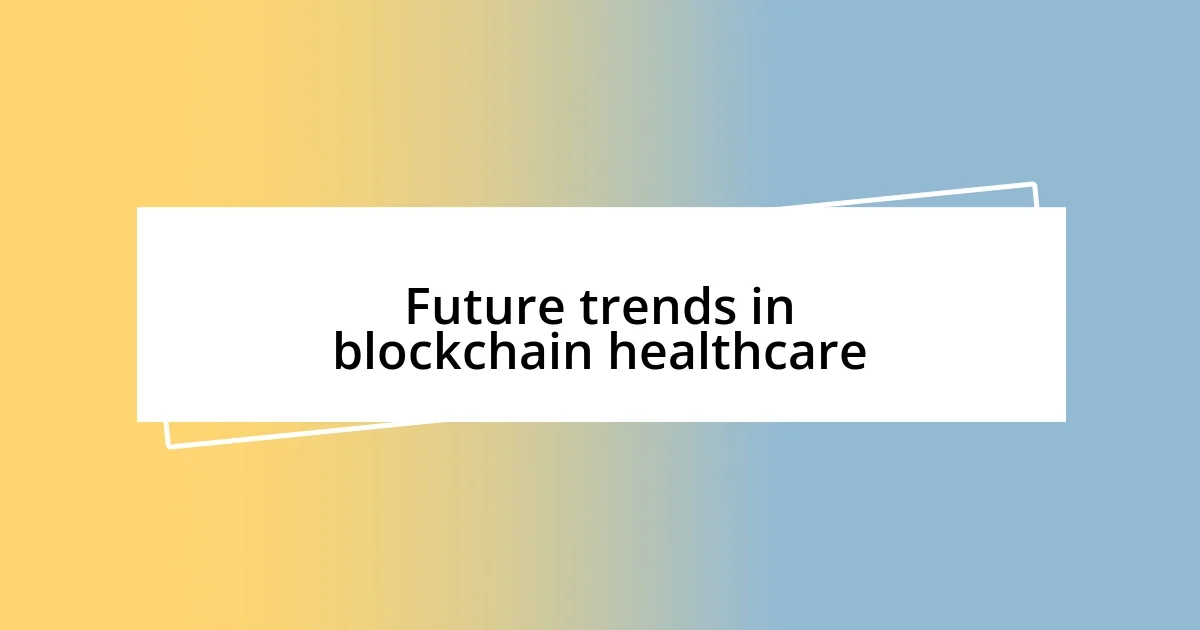
Future trends in blockchain healthcare
As I look ahead, I see several exciting trends on the horizon for blockchain in healthcare. For example, the rise of decentralized health networks is something I find particularly compelling. Imagine a future where patients have complete control over their medical data, sharing it selectively with providers or researchers while maintaining privacy and security. It’s not just a dream; it’s becoming a reality that could empower individuals like never before.
Moreover, I can’t help but wonder about the potential impact of smart contracts in healthcare transactions. These self-executing contracts could eliminate so much red tape and streamline billing and reimbursement processes. When I first learned about how these contracts automatically trigger payments based on pre-set conditions, it felt like a light bulb moment. Why deal with the often cumbersome claim processes when this technology can simplify everything?
In addition, I’ve noticed increasing interest in using blockchain for drug traceability. With the alarming prevalence of counterfeit medications, tracking the entire supply chain using blockchain could significantly reduce these risks. Reflecting on my interactions with patients who’ve grappled with receiving falsified drugs, I can’t express how vital this development seems. Knowing that technology could safeguard their health gives me hope for a more trustworthy pharmaceutical landscape. What if we could guarantee the authenticity of every single pill? That’s a goal I think we should all strive for.



